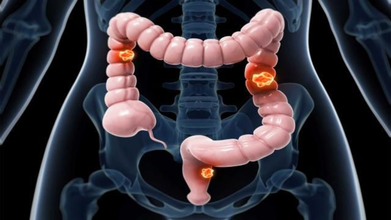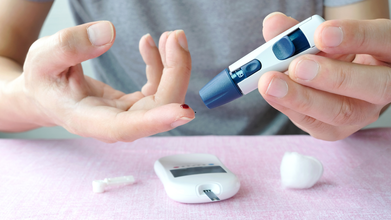- Health Conditions A-Z
- Health & Wellness
- Nutrition
- Fitness
- Health News
- Ayurveda
- Videos
- Medicine A-Z
- Parenting
Your Big Butt Might Be Making You Smarter- Science-Backed Reasons To Love Your Curves

Image Credit: Canva
Whether if it is the influence of social media, fashion, or societal expectations, most people fight to accept their natural body shape. For years, society imposed unattainable beauty standards, idealizing slender physiques and too often dismissing curvier physiques. What if the science were otherwise? What if having a large butt wasn't merely a matter of looks but had some unexpected health perks—ones that would make you stronger, healthier, and even smarter? Studies indicate that a more voluptuous backside isn't merely a style; it's a biological plus. From brain-enhancing advantages to improved heart health, your curves are doing you some good in ways you never thought possible. It's time to leave the insecurities behind and own the science-supported strength of your big booty!
Scientific studies indicate that where fat is deposited on your body has varying effects on your health. Contrary to visceral fat that is stored around the waist and contributes to severe health complications, fat deposited in hips, thighs, and butt is deemed favorable. This fat is referred to as subcutaneous fat, and research has indicated that it has a protective function in metabolic well-being. Additionally, scientists have discovered that people with greater lower-body fat stores have improved cardiovascular health, lower inflammation, and even greater cognitive function. Let's discuss the different science-supported advantages of having a large butt.
1. Lower Risk of Chronic Diseases
A more curvy lower body could be a protective factor against deadly diseases. A September 2020 meta-analysis in The BMJ concluded that people with a bigger hip and thigh circumference were less likely to die early in life compared to those who had fat around their waist. Fat in the buttocks releases healthy hormones, including adiponectin, which protects against heart disease, diabetes, and stroke. Furthermore, individuals who have a positive waist-to-hip ratio possess well-balanced cholesterol profiles, higher levels of good HDL cholesterol, and lower amounts of detrimental LDL cholesterol. Having such a balance decreases the risk for cardiovascular diseases and helps a person live a longer life.
2. A Brain-Boosting Advantage
Believe it or not, your big booty may be smarter than you think. A study in the International Journal of Obesity in 2010 discovered that women with bigger butts have greater amounts of omega-3 fatty acids, which are required for brain function. Omega-3s contribute to the construction of cell membranes of the brain and possess anti-inflammatory as well as antioxidant effects that facilitate mental health. For new mothers, stored fat becomes even more vital, as it delivers essential fatty acids to their infants through breast milk, adding to better brain development in kids.
3. Better Physical Performance
A strong posterior isn't all about appearance—it's the key to athletic performance. Your gluteus maximus is your body's biggest muscle, and it's what drives movements like running, stair climbing, and weightlifting. Powerful glutes give you stability, enhance balance, and create power for intense exercise. In fact, people with stronger glutes can lift more, run quicker, and excel at sports and endurance exercises. Because bigger muscles burn more calories, a strong butt also helps you keep your metabolism healthy and avoid weight gain.
4. Less Chance of Back Pain
If you have back pain, your glutes may be your best protection. Weakened or underdeveloped glutes require smaller, weaker muscles—such as those in the lower back—to overcompensate. This can result in strain, poor posture, and chronic pain. A 2015 Journal of Physical Therapy Science study discovered that people who have well-developed glutes have reduced lower back pain as a result of enhanced lumbar muscle strength and balance. Strengthening the glutes keeps the posture upright and avoids excessive stress on the spine, which makes daily functioning simpler and more pleasant.
5. Proper Posture and Core Strength
Your posterior chain of muscles, consisting of your glutes, lower back, and hamstrings, is what maintains good posture. Spending many hours sitting or living a sedentary life weakens these muscles, creating a slouching posture. But a well-conditioned butt does so naturally, supporting spinal alignment and keeping you upright and reducing lower back strain. Strong glutes can also help prevent such common postural problems as anterior pelvic tilt, where the pelvis tilts forward because of weak muscles.
6. Prevention of Leg and Knee Injuries
Your lower body strength is directly connected to injury prevention. Weak glutes cause other muscles, including hamstrings and quadriceps, to overwork and become strained, leading to risk of tears and strains. Harvard Health Publishing underlines that the stronger your butt is, it can stabilize knees, making injury to the knees, ligament, and even overuse illnesses like IT band syndrome less possible. Whether one is an athlete or simply one who loves exercising every day, well-developed glutes supply the necessary strength for your knee and legs.
7. A Natural Self-Esteem Booster
Apart from the physiological health advantages, a large booty can lead to a good self-image and mind state. Researchers indicate that self-assuredness in one's body makes an individual more susceptible to practicing healthier habits, for example, proper exercise and meeting people. Having confidence in the body can ensure better self-image, more intense relationships, and an active way of life. Rather than concentrating on unrealistic beauty standards, accepting your natural shape can allow you to choose health over pressures from society.
How to Practice Self-Love
If you are having a difficult time with your curves and you want to change, the following are simple tips to practice body acceptance:
Practice Positive Body Language: Discredit negative messages regarding your body and replace them with positive affirmations.
Be around Positive Influences: Interact with others who promote and celebrate body acceptance.
Keep An Eye On Social Media: Stop following accounts that show unrealistic body ideals and subscribe to body-positive influencers.
Dress In What Flatters Your Body: Fashioning for your body type will make you more confident and comfortable in your skin.
The next time you pass by the mirror, keep in mind that your curves are more than just an appearance—they contribute to your physical health, brawn, and even brain function. From warding off chronic disease to enhancing athletic performance and mental health, your big butt is a force to be reckoned with. Science proves that loving your natural shape is not only liberating but also key to living a long and healthy life. So, own your curves, love their benefits, and celebrate the body that carries you through each day.
Ramadan Fasting: Avoid Excess Salt And Caffeine To Boost Kidney, Prostate Health, Say Experts

Credit: Canva
Dehydration is a serious concern for people fasting during the month-long Ramadan period, and can severely impact kidney and prostate health. Experts suggested that avoiding excess salt and caffeine can help.
While Ramadan fasting is generally safe for people with early-stage chronic kidney disease (CKD), maintaining adequate hydration between iftar and sehri -- the two important meals each day for faithful observing the fasting -- is of significant importance.
Dehydration can lead to acute kidney injury and electrolyte imbalances for individuals with advanced CKD. As prolonged fasting hours -- more than 12 hours a day -- urine becomes concentrated, increasing the risk for kidney stones and Urinary Tract infections (UTIs).
For men with prostate problems, fasting during Ramadan can pose challenges, such as Benign Prostatic Hyperplasia (BPH) or an enlarged prostate, primarily due to dehydration.
“As a practicing urologist and kidney transplant surgeon in India, I often notice a rise in kidney stone pain and urinary infections during Ramzan. When patients fast for long hours -- especially in our warm climate -- urine becomes highly concentrated. That increases the risk of stones and UTIs. Men with prostate enlargement sometimes report worsening urinary flow because they consciously reduce fluid intake,” Dr. Pankaj Panwar, Additional Director, Urology, Fortis Escorts Okhla, New Delhi, told HealthandMe.
The doctor advised people “to hydrate strategically between Iftar and Sehri, avoid excess salt and caffeine”.
How Excess Salt And Caffeine Impact Ramadan Fasting
Consuming high-sodium foods such as processed meats, pickles, salty snacks, and fast food during iftar or sehri can increase thirst and dehydration.
High salt intake forces the body to pull water from cells to dilute the sodium, leading to severe thirst. It can also lead to bloating.
Similarly, caffeine in coffee, tea, chocolate, and energy drinks can be diuretic and cause the body to lose fluids and salts through increased urination. Particularly, drinking coffee or tea at sehri -- the pre-dawn meal -- can lead to faster dehydration during the day.
Caffeine consumption, especially late in the evening, can also interfere with sleep, making it harder to wake up for sehri.
“Ramzan is a sacred month of fasting, but prolonged abstinence from water, especially in hot climates, can increase dehydration risk. Concentrated urine puts stress on the kidneys and may worsen kidney stones or trigger urinary tract infections,” Dr. Mangesh Patil, Urologist at Saifee Hospital, Mumbai, told HealthandMe.
Dehydration during Ramadan fasting can lead to symptoms like headaches, extreme thirst, fatigue, and dizziness. But in case of severe dizziness, fever, confusion, or blurred vision, the experts warned of immediate medical help.
“Do not ignore warning signs like flank pain, fever, or difficulty passing urine. A little planning can prevent an emergency hospital visit,” Panwar said.
Patil said warning signs include severe flank pain, burning urination, fever, vomiting, blood in urine, or reduced urine output. Men with Benign Prostatic Hyperplasia may notice worsening urinary symptoms.
Tips To Prevent Complications
- Drink 2-3 liters of water between iftar and sehri
- Include water-rich fruits
- Avoid excess salt and caffeine
- Individuals with kidney disease, stones, UTIs, or prostate issues should consult their doctor before fasting.
The Common Colon Cancer Sign You Need To Look Out For

Credit: Pinterest
Colon (colorectal) cancer begins when small growths called polyps form on the inner lining of the colon or rectum. Over time, changes in the DNA of these cells can cause the polyps to become cancerous.
As abnormal cells multiply, they replace healthy cells and eventually form a mass known as a tumor. This process develops slowly, often taking up to ten years for a precancerous polyp to turn into cancer and begin showing symptoms.
Colon cancer poses serious health risks because cancerous cells can invade healthy tissues. Over time, they may break away and spread to other parts of the body, making detection more difficult since the symptoms can resemble other conditions.
What Is the First Sign of Colon Cancer You Shouldn’t Ignore?
Colon cancer can be difficult to detect because it often develops without obvious symptoms. However, doctors emphasize that the number one warning sign is rectal bleeding or blood in your stool.
"Colon cancer can be hard to diagnose because it can develop asymptomatically,” said Dr. John Nathanson, a gastroenterologist at New York-Presbyterian Allen Hospital.
Dr. Pratima Dibba adds that this symptom should not be misdiagnosed as hemorrhoids, infection, or constipation, since early signs of colon cancer can look similar.
She urges patients to get checked promptly to rule out serious conditions.
Research from the Cleveland Clinic also shows that blood in stool can originate anywhere in the gastrointestinal tract, including the colon.
Detecting colon cancer early is critical, as survival rates can be as high as 90 percent when caught in its initial stages.
What Are Other Symptoms Of Colon Cancer?
Persistent changes in bowel habits (diarrhea, constipation, or narrowing of stool). Other signs include:
- Abdominal (belly) pain
- Bloated stomach
- Constipation or diarrhea
- Feeling like there’s still poop in your bowel even after you go to the bathroom
- Feeling tired or weak
- Unexplained weight loss
Present Day Scenario In India
Colorectal cancer (CRC) is a major health concern worldwide. In India, it is the fourth most common cancer among both men and women. In 2022, there were 64,863 new cases and 38,367 deaths.
Projections suggest that incidence will continue to rise by 2026, reflecting both lifestyle changes and improved detection.
Compared to developed countries, survival rates in India remain lower, largely due to late-stage diagnosis and limited access to screening programs.
The American Cancer Society notes that colorectal cancer is a cancer that starts in the colon or the rectum. Colorectal cancer impacts around 1.9 million people every year, noted the World Health Organization (WHO) as per its 2022 data.
Some of the risk factors include risk factors involve being over the age 50, family history, certain genetic syndromes (like Lynch syndrome), inflammatory bowel diseases, and lifestyle factors (diet high in red meat, alcohol, smoking, inactivity).
The most effective way to prevent colorectal cancer is through annual colonoscopies, screening and stool tests.
Chinese Scientists Could Reverse Type 2 Diabetes Through Stem Cell Therapy

Credits: Canva
For the longest we have been told that Type-2 diabetes though can be maintained, cannot be fully reversed. However, Chinese scientists may have found a cure, thanks to stem cell therapy. Chinese scientists have achieved the first case in the world in reversal of type-2 diabetes.
What Is Type 2 Diabetes?
Diabetes is a condition characterized by high blood sugar (glucose) levels. It develops when the pancreas either doesn't produce enough insulin, doesn't produce any insulin at all, or when the body doesn't respond properly to insulin, a condition known as insulin resistance.
Type 2 diabetes is the most common form of diabetes and occurs when your body doesn't use insulin properly. The risk of developing Type 2 diabetes increases if you are overweight or obese, or if you have a family history of the condition.
What Did The Study Find?
First, researchers collected stem cells, either from the patient’s own body or from a donor. These cells are valuable because they can develop into many different specialised cell types and take over specific biological functions.
In the laboratory, scientists exposed the stem cells to carefully designed chemical signals and genetic instructions. This guided them to become pancreatic islet cells, more precisely, beta cells, the body’s natural insulin-producing cells.
Once reprogrammed, the cells were grown into small clusters that resemble real pancreatic tissue damaged in diabetes. These clusters are capable of sensing blood sugar levels and releasing insulin when required.
Next came transplantation. The insulin-producing clusters were implanted into the patient’s body, in this case, the abdomen. After implantation, they connected to the bloodstream and began functioning within the body.
After transplantation, the new cells begin behaving like healthy pancreatic beta cells. They sense rising blood glucose levels and release insulin in response, helping bring sugar levels down naturally and reducing, or sometimes removing, the need for insulin injections.
Doctors then closely monitor the patient over time to make sure the cells survive, continue producing insulin, and do not trigger immune rejection or other complications.
This approach falls under regenerative medicine, where the goal is not just to manage type-2 diabetes but to repair the underlying problem by rebuilding the body’s insulin-producing ability.
The early outcome is encouraging, but caution is essential. The success comes from a single case, and that alone cannot prove the treatment works broadly. Larger clinical trials across diverse patient groups are necessary to confirm both safety and effectiveness before it can be considered a reliable therapy.
Why Does This Study Matters Especially For India?
Many experts have recognized India as the diabetes capital, with type-2 diabetes being the most common cost. Globally, diabetes affects about 90 million adults between the ages 20 to 70 years, with over 90 per cent of these cases are of type-2 diabetes. India had 89.8 million adults between ages 20 to 79 years living with diabetes in 2024 and the numbers are expected to increase to 100 million by the end of 2026. This is why this stem cell therapy could prove to be of great help in controlling the numbers, especially for insulin-dependent patients.
© 2024 Bennett, Coleman & Company Limited

